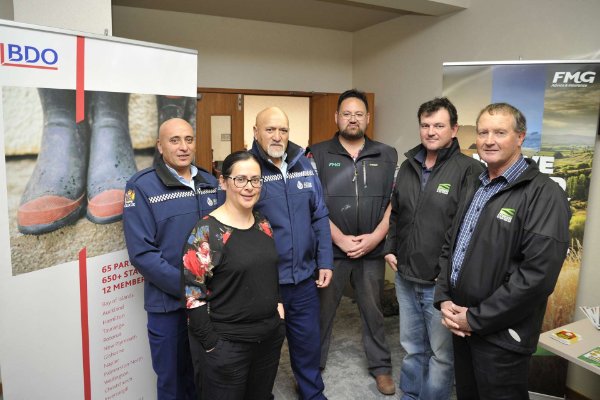
“HUGE PROBLEM”: The multimillion-dollar problem of rural crime throughout New Zealand, and in this district, was highlighted in a special seminar on the subject held at BDO in Gisborne. Those attending included Senior Constable Brian Leach (Tokomaru Bay police), Kylee Potae (partner BDO Gisborne and Maori business sector leader), Constable Mutu Noanoa (Matawai police), Hiki Swann (rural manager FMG in Gisborne), Charlie Reynolds (Gisborne-Wairoa Federated Farmers provincial president) and Rick Powdrell (Federated Farmers rural security spokesman). Picture by Liam Clayton
A RURAL crime seminar in Gisborne was told that ingenious professionals, and not just thieves involved in backyard slaughter, have been stealing stock in this region, at times on a commercial scale.
The perpetrators had a knowledge of farming, access to dogs, probably had farm work experience and worked at night, the meeting heard.
About 30 farmers, farm administrators and others attended a seminar last week at the BDO offices, sponsored by FMG in partnership with Federated Farmers, AgFirst and the police.
Matawai police officer Constable Mutu Noanoa gave a presentation based on a project police have carried out on crime trends including stock theft.
“There have been 351 incidents of reported stock theft here in the past five years and it has involved $500,000-plus worth of stock each year.
“At certain times of the year a major crime ring operates in the district on stock theft and it’s commercial-scale theft, not just backyard theft,” Constable Noanoa said.
“At the moment it has slowed down a bit because it trends at certain times of the year.”
The people who did it commercially really knew what to do, he said.
“They’re professionals, with precision cuts in the meat they steal and sell. They are good at it but they cause a lot of damage doing it.”
The commercial thieves were “ingenious”, he said.
“They have more time on their hands than you and I, and stock theft is what they do. It’s all they do.
“They have a working knowledge of the farming industry, so they might be either current or past farm workers.
“They have access to dogs. A thief with one good dog can round up 100 sheep easily at night and steal the lot,” Constable Noanoa said.
Possible legitimate outlets
“They might even have legitimate outlets for the meat they steal and some might even run a legitimate business in the farming community.
“They lease, or have access to, land for grazing the stock they steal.”
Constable Noanoa said smaller-scale backyard thieves also had a network to disperse the meat they steal.
“They tend to more frequently visit rural areas and steal a boot-load of sheep.”
The seminar discussed a range of issues involving stock theft and rural crime in general, and talked about measures being taken to curb it.
Constable Noanoa pointed to the success of the Whatatutu community safety project that involved installation of cameras and signage to crack down on rural crime in that district.
“There has been a 33 percent reduction in all crime in the Whatatutu and Te Karaka areas since the project was acted on.
“It has empowered that community and is a simple, repeatable model that works.
“It has also increased communities’ trust and confidence in police.”
Seminar participants divided into a couple of workshop groups for a general discussion on rural crime and stock theft in particular.
“There is greater awareness of the value of surveillance cameras now, because they work,” said one seminar participant, who gave an example of how a camera had led to an offender.
Getting the right camera to monitor
Police said it was important to get the right sort of camera.
“If you’re going to do it, you need to put in a decent one and they are worth $12,000 to $18,000.”
There was talk about the need for better communication between rural residents to help each other keep an eye out for thieves.
“Neighbourhood watch — if you are on the same road, be on the same page,” police said.
“Vet your staff. Be aware of who you are employing and who is associated with them.”
Facebook and social media were cited as places farmers could go to find out more.
“It’s all on social media.”
Police urged farmers to report every time they had something stolen, no matter how big or small the theft was.
“Even the little things help build up a picture of what’s happening crime-wise in an area," police said.
“Please do not think it’s not worth reporting it."
“Make all of your assets as hard to steal as possible,” said Federated Farmers rural security spokesman Rick Powdrell.
“A $60 padlock on a gate is a small investment to save $8000 to $10,000 worth of stock.”
The comment was made that the rural community had to help police do their job, not just leave it up to them.
FMG Insurance spokesman Scott Kahle said in the past five years his company had dealt with $1.5 million in theft claims from farms in this district.
“That was 7 percent of the total number of claims nationally for rural burglary and theft totalling $24.2 million.
“That is just claims with FMG customers. Double it to get the full national picture.
“Rural crime is a huge problem.”
Murray Robertson, Gisborne Herald
31 July 2017
http://bit.ly/2uUhRz4